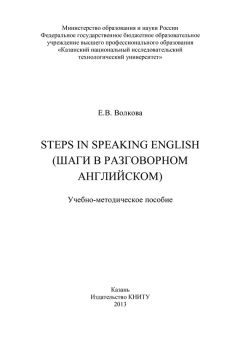
Автор книги: Елена Волкова
Жанр: Учебная литература, Детские книги
сообщить о неприемлемом содержимом
Текущая страница: 4 (всего у книги 4 страниц)
Lesson IX. Job, Work, Interview with the employer
Vocabulary. Work.
work outside, work inside, earn a good salary, travel a lot, work with people, work with animals, work with machines, work alone, be creative, be active, have a lot of responsibility, stressful job
Exercise 1. Describe the jobs with these phrases.
farmer, barman, mechanic, chef/cook, market researcher, airline pilot, shop assistant, interpreter, teacher, nurse, diplomat, driver, manager, director, policeman, doctor, sailor, businessmen, butcher, baker, potter
Exercise 2. Read the adverts and match them with jobs from Exercise
1. Do you like creating new menus? Would you like to join a new catering company? We cater for weddings, parties and business conferences.
2. Have you got a good telephone voice? Would you like to wok from home? Would you like to choose what time you work? We need people to conduct phone interviews about products for an advertising agency.
3. Do you like learning new skills? Would you like to work with cars and motorbikes? Our motor repair business offers young people on–the–job training.
4. Do you like working with people? Would you like to work in a busy nightclub? Then we need you for a new club that’s opening soon in Manhattan.
Exercise 3. Read the adverts again and choose:
1. a job you would like to do
2. a job you wouldn’t like to do
Exercise 4. In pairs, discuss why you choose or didn’t choose each job.
Exercise 5. Read the newspaper article.
Could you share your job?
There are 1/3 million people without jobs in this country. People with jobs often say that they have too much work and no time to relax with the family. Is the answer job sharing? Of course, the idea of another person doing half your job is wonderful, but what about getting half your usual pay?
Exercise 6. Answer these questions.
1. Which of these jobs can/can’t people share easily?
a taxi driver, a musician, a secretary, a teacher
2. What problems can be there when people share a job?
3. Have you ever shared a job?
4. Would you like to share your job and salary with another person?
5. Is job sharing convenient?
Vocabulary. Jobs revision.
plumber, firefighter, fashion designer, lawyer, receptionist, secretary, managing director, sales rep., surgeon, veterinarian, street cleaner
Exercise 7. Do you have a job? How do you say it in English? Find out what jobs three other students do. If you don't know what they are, ask the student to explain.
Exercise 8. Discuss these questions with a partner. Look again at the jobs from vocabulary.
1. Which one would you most/least like to do? Why?
2. Do you have a 'dream job'? What is it? Why is it your 'dream job'?
Vocabulary. Work.
get promoted, be offered a job, run your own company, apply for a job, work long hours, resign, have an interview, prepare a CV, take a job
Exercise 9. Which of the things from vocabulary have you done? Tell another student about your experience.
Exercise 10. What is the difference in meaning of these words?
1. an employer/an employee (who is the boss? who is the worker?)
2. an interviewer/an interviewee (who applies for a job? who conducts the interview?)
3. an application form/a CV (what is provided by the company and you complete it to apply for a job? what is a summary that you provide about your qualifications and experience?)
4. experience/qualifications (what refers to education and courses you have completed? what refers to the things you have done related to a job?)
5. a salary/a bonus (what do you earn from your job monthly or annually? what is a special payment you are given for a good work?)
6. a receptionist/a secretary (who deals with general administration? who works on a desk at the entrance to a business dealing with new arrivals?)
7. a company/a factory (what refers to a business in general? what refers to a building where things are produced?)
8. a managing director/a sales rep. (who is responsible for selling the things the company makes? who manages and owns part of a company?)
Exercise 11. Discuss.
1. What qualities make a good interviewer/ secretary/sales rep./managing director?
2. What information should you include in a CV? What order should it be in?
3. What is a typical salary in your country for a secretary/a sales rep.?
4. Would you rather have a high salary and no bonus, or an average salary and possible bonuses?
5. When was the last time you were an interviewee? How did you feel?
Vocabulary. Preparations for the interview.
dress officially, find information about the company, make a list of questions about the company, think about your positive qualities, get enough sleep, send your resume, get up early, not to use a lot if make–up, make a hairdo, fill the application form
Exercise 12. What must you do to be successful in a job interview?
Make a list under these headings:
1. Before the interview
2. During the interview
3. After the interview
Compare your list with other students. Do you have the same points?
Exercise 13. Read and translate the advice.
HOW TO GET THAT JOB!
1. Before the interview:
– Find out as much as you can about the company.
– Think about questions which the interviewer might ask you. Plan how to answer them.
– Dress smartly.
– Don't be late. If you are very early, have a coffee in a local cafe and look at your notes.
– Switch off your mobile and take two or three slow, deep breaths before you go in.
2. During the interview:
– When you walk in, shake hands firmly with the interviewer, look them in the eyes, and say 'Pleased to meet you'.
– Answer the questions in a confident, firm voice. Don't speak too quietly, too quickly or be too hesitant.
– Answers should not be one word or one sentence, but also should not be too long.
– When answering questions, maintain eye contact with the interviewer. If there is more than one interviewer, give them equal attention.
– Give clear, direct answers to questions. If you don't know something, say so.
– Don't lie.
– At the end of the interview, you might be asked: 'Are there any questions that you would like to ask us?' Make sure you have one or two good questions ready.
– Above all, be positive and show enthusiasm for the job.
3. After the interview:
– If you didn't answer a question well in the interview, don't be afraid to phone up soon afterwards and say something like: 'I don't think I explained myself very well in the interview. What I wanted to say was …' this will show enthusiasm and it will remind them of you.
Exercise 14. Read the advice again. Answer these questions.
1. What research do you need to do before the interview?
2. What kind of clothes should you wear to the interview?
3. What should you do if you arrive very early?
4. What should you do just before you enter the interview room?
5. What should you do and say when you meet the interviewer?
6. How long should your answers to questions be?
7. How should you answer questions?
8. Where should you look when you answer questions?
9. What should your general attitude be in the interview?
10. What should you do after the interview?
Exercise 15. Discuss.
1. Do you disagree with any of the points? If so, which ones? Why?
2. Do you think you are good or bad at job interviews? Why?
3. Would you rather work for yourself or work in a company? Why?
Communication: Telephone calls
Grammar revision:
Обращение прямой речи в косвенную:
1. Личные и притяжательные местоимения прямой речи заменяются по смыслу, как и в русском языке:
He says, "I have your book." => He says that he has my book.
2. Если глагол, вводящий косвенную речь, употреблен в одном из прошедших времен, то время глагола прямой речи заменяется в косвенной речи другим временем, согласно правилу согласования времен.
He said, "I know it." => He said that he knew it.
"I am working," she said. => She said that she was working.
He said, "I have translated the text." => He said that he had translated the text.
He said, "I get up at eight o'clock." => He said that he got up at eight o'clock.
He said, "I have been waiting for you since five o'clock." => He said that he had been waiting for me since five o'clock.
3. Если в прямой речи был задействован глагол в прошедшем времени, то в косвенной речи этот глагол меняется на соответствующий глагол в прошедшем совершенном времени.
He said, "I saw her there." => He said that he had seen her there.
She said, "I was reading." => She said that she had been reading.
4. Если в прямой речи глагол употреблялся в прошедшем совершенном времени, то в косвенной речи этот глагол остается без изменения:
He said, "We had finished our work by six o'clock." => He said that they had finished their work by six o'clock.
5. Если в прямой речи глагол употреблялся в одном из будущих времен, то в косвенной речи этот глагол меняется на соответствующий глагол во времени будущее в прошедшем:
He said, "I will go there." => He said that he would go there.
6. Указательные местоимения и наречия времени и места, употребляемые в прямой речи, заменяются в косвенной речи по смыслу другими словами, как и в русском языке:


Word list:


Exercise 16. Read, translate and reproduce this dialogue.
A telephone call on the expense claim.
Exercise 17. Read, translate and reproduce the dialogue: a) as it is, b) in reported speech.
John: John David.
Phil: It’s Phil Buck from Accounts here. I received your expense claim a few minutes ago.
John: Yes?
Phil: And there are two things I’m not clear about. How long did you stay in France?
John: Well, I went on Monday evening and I came back on Thursday morning.
Phil: So three nights in a hotel. OK. And did you fly direct to Lyon?
John: No I didn’t have the time to book my ticket until last Saturday. I couldn’t get a seat on the plane to Lyon so I flew to Paris and took the train down the next day.
Phil: I see. And what hotel did you stay in?
John: Well I tried to book a three star hotel but there was a big Trade Fair on and I had to go to Five star hotel.
Phil: Why did you go?
John: Well there was a problem with our agent there. So I went to find a solution.
Phil: I hope you found one because the trip was very expensive.
John: I did, don’t worry. I sorted everything out.
Phil: Look, because the expenses are over the limit, I’ll have to get the Sales Director to approve them.
John: Fine by me. Go ahead.
Exercise 18. Read, translate and reproduce the dialogue: a) as it is, b) in reported speech.
A telephone conversation
– Smith speaking.
– Good morning, Mr.Smith. Antonov of Tatneft speaking.
– Good morning, Mr.Antonov. what can I do for you?
– Well, we are having some trouble with the tanker “Baku” № 7563/37 we chartered for the transport of oil under contract № 7563 /37.
– What’s the matter with her?
– She was badly damaged on her way to the port of loading during a severe storm in the Black Sea.
– What bad luck. What are you going to do about it?
– We did all we could to secure another vessel of the same tonnage but failed.
– That’s too bad. We need the goods urgently.
– We’re terribly sorry about this unforeseen complication, but there is a way out.
– What’s that?
– We could arrange shipment by another vessel it you agree to accept a larger cargo.
– How large is the vessel?
– 10000 tons.
– What about the ship’s sailing date?
– About the 20th of September.
– But the increase in cargo would mean extra storage expenses to us.
– I’m afraid, in the circumstances it’s the only way out.
– Well, I’ll consult my people. I’ll call you back this afternoon.
– Right.
Exercise 18. Make up dialogues based on the following assignments:
1. You have just received a cable informing you that the tanker chartered by you will not be able to arrive at the port of loading in time as she was damaged in a storm. Phone the Buyers and inform them that you will deliver the goods with delay.
2. You have just received a cable from the sellers asking you to agree to put off the ship’s sailing date. You cannot agree to the Seller’s request, give your reasons.
3. Meet the representative of the firm and tell him that they will have to pay storage expenses as their ship failed to arrive at the port of loading in time.
Exercise 19. Read, translate and reproduce the dialogue: a) as it is, b) in reported speech.
Telephone talk
– Smith speaking.
– Good afternoon, Mr. Smith. Bogdanov of Tatneft here.
– Good afternoon, Mr.Bogdanov.
– We’ve got your cable today that the machines are ready for the inspection and test.
– So when are your inspectors coming?
– We suggest that you should test the machines without our inspectors.
– So you are waiving the inspection? Fine. Then we’ll be able to ship the goods earlier.
– When are you starting the test?
– The day after tomorrow, I think. The preliminary tests that we made a fortnight ago were quite satisfactory and I hope we’ll be able to send the test report next week.
– Splendid. We’ll send you our release notes for shipment as soon as we receive the test report.
– Right.
Word list:

Exercise 20. Translate the dialogues and in a week’s time translate it back into English from memory.
A telephone talk
Mel dialed his home number and Roberta, his daughter, answered.
– Hi, this is your old man.
– Yes, I know.
– How was school today?
– Could you be specific, Father? There were several classes. Which do you want to know about?
– Never mind. Is your mother home?
– She went out. She said if you phoned to tell you, you have to be downtown to meet her, and for once try not to be late.
– If your mother calls, tell her I might have to be a little late, and that I can’t help it. Did you hear me?
– Yes. Is there anything else, Father? I have homework to do.
– Yes, there is something else. You’ll change your tone of voice, young lady, and show a little more respect. Furthermore, we’ll end this conversation when I’m good and ready.
– If you say so, Father.
– And stop calling me Father!
– Very well, Father.
LITERATURE
1. Acklam, R.Total English. Pre– Intermediate. Student’s book/ R. Aclam, A. Grace. – England: Longman, 2005. – 160 p.
2. Conversational English: учебник/ М.А.Серафимова [и др.]; общ. ред. А.М. Шаевича. – М.: Наука, 1979. – 160 с.
3. Cotton, D. Market Leader. Intermediate Business English Course Book/ D. Cotton, D Falvey, S. Kent. – England: Longman, 2005. – 176 p.
4. Cunningham G. Language to go. Pre – Intermediate. Student’s book/G. Cunningham, S.Mohamed. – England: Longman, 2002. – 128 p.
5. Hughes, J. Telephone English/ J. Hughes.– England: Macmillan Publishers limited, 2006 – 95p.
6. Khannikova, L.N. Spoken English/ L.N. Khannikova. – Москва: КомпьютерПресс, 1991. – 236 c.
7. New Opportunities. Pre– Intermediate. Student’s book /М.Harris [at all]; – Russia: Longman, 2006 – 316 р.
8. Шелкова,Т.Г.Деловой английский/T.Г.Шелкова, Л.Я.Лясецкая. – М.: Вече,1999. – 611с.
Правообладателям!
Это произведение, предположительно, находится в статусе 'public domain'. Если это не так и размещение материала нарушает чьи-либо права, то сообщите нам об этом.








































